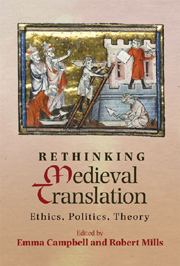Book contents
- Frontmatter
- Contents
- List of Illustrations
- List of Contributors
- Acknowledgements
- Introduction: Rethinking Medieval Translation
- 1 On Not Knowing Greek: Leonzio Pilatus's Rendition of the Iliad and the Translatio of Mediterranean Identities
- 2 Translation and Transformation in the Ovide moralisé
- 3 Translating Lucretia: Word, Image and ‘Ethical Non-Indifference’ in Simon de Hesdin's Translation of Valerius Maximus's Facta et dicta memorabilia
- 4 Translating Catharsis: Aristotle and Averroës, the Scholastics and the Basochiens
- 5 The Ethics of Translatio in Rutebeuf's Miracle de Théophile
- 6 Invisible Translation, Language Difference and the Scandal of Becket's Mother
- 7 Medieval Fixers: Politics of Interpreting in Western Historiography
- 8 The Task of the Dérimeur: Benjamin and Translation into Prose in Fifteenth-Century French Literature
- 9 The Translator as Interpretant: Passing in/on the Work of Ramon Llull
- 10 Rough Translation: Charles d'Orléans, Lydgate and Hoccleve
- 11 Bueve d'Hantone/Bovo d'Antona: Exile, Translation and the History of the Chanson de geste
- Untranslatable: A Response
- Bibliography
- Index
Untranslatable: A Response
Published online by Cambridge University Press: 05 April 2013
- Frontmatter
- Contents
- List of Illustrations
- List of Contributors
- Acknowledgements
- Introduction: Rethinking Medieval Translation
- 1 On Not Knowing Greek: Leonzio Pilatus's Rendition of the Iliad and the Translatio of Mediterranean Identities
- 2 Translation and Transformation in the Ovide moralisé
- 3 Translating Lucretia: Word, Image and ‘Ethical Non-Indifference’ in Simon de Hesdin's Translation of Valerius Maximus's Facta et dicta memorabilia
- 4 Translating Catharsis: Aristotle and Averroës, the Scholastics and the Basochiens
- 5 The Ethics of Translatio in Rutebeuf's Miracle de Théophile
- 6 Invisible Translation, Language Difference and the Scandal of Becket's Mother
- 7 Medieval Fixers: Politics of Interpreting in Western Historiography
- 8 The Task of the Dérimeur: Benjamin and Translation into Prose in Fifteenth-Century French Literature
- 9 The Translator as Interpretant: Passing in/on the Work of Ramon Llull
- 10 Rough Translation: Charles d'Orléans, Lydgate and Hoccleve
- 11 Bueve d'Hantone/Bovo d'Antona: Exile, Translation and the History of the Chanson de geste
- Untranslatable: A Response
- Bibliography
- Index
Summary
Babel: un nom propre d'abord, soit. Mais quand nous disons Babel aujourd'hui, savons-nous ce que nous nommons? Savons-nous qui? Considérons la survie d'un texte légué, le récit ou le mythe de la tour de Babel: il ne forme pas une figure parmi d'autres: Disant au moins l'inadéquation d'une langue à l'autre, d'un lieu d'encyclopédie à l'autre, du langage à lui-même et au sens, il dit aussi la nécessité de la figuration, du mythe, des tropes, des tours, de la traduction inadéquate pour suppléer à ce que la multiplicité nous interdit. En ce sens il serait le mythe de l'origine du mythe, la métaphore de la métaphore, le récit du récit, la traduction de la traduction. Il ne serait pas la seule structure à se creuser ainsi mais il le ferait à sa manière (elle-même à peu près intraduisible, comme un nom propre) et il faudrait en sauver l'idiome.
[Babel: a proper noun in the first instance, perhaps. But when we say Babel today, do we know what it is we are naming? Do we know of whom we speak? Let us consider the survival of a text bequeathed, the narrative or the myth of the tower of Babel: it is not just one figure among others: speaking as it does of the inadequacy of one language to another, of one place in the encyclopaedia to another, of language to itself and to meaning, it also speaks of the necessity of figuration, of myth, of tropes, of towers [turns] of inadequate translations to supplement that which plurality forbids us. […]
- Type
- Chapter
- Information
- Rethinking Medieval TranslationEthics, Politics, Theory, pp. 243 - 256Publisher: Boydell & BrewerPrint publication year: 2012



